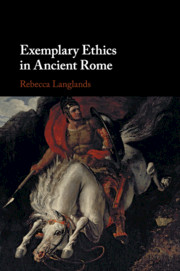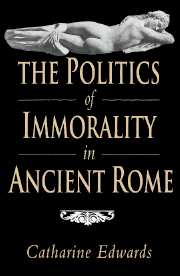Exemplary Ethics in Ancient Rome
- Author: Rebecca Langlands, University of Exeter
- Date Published: December 2020
- availability: Available
- format: Paperback
- isbn: 9781108971645
Paperback
Other available formats:
Hardback, eBook
Looking for an inspection copy?
Please email [email protected] to enquire about an inspection copy of this book
-
This ground-breaking study conveys the thrill and moral power of the ancient Roman story-world and its ancestral tales of bloody heroism. Its account of 'exemplary ethics' explores how and what Romans learnt from these moral exempla, arguing that they disseminated widely not only core values such as courage and loyalty, but also key ethical debates and controversies which are still relevant for us today. Exemplary ethics encouraged controversial thinking, creative imitation, and a critical perspective on moral issues, and it plays an important role in Western philosophical thought. The model of exemplary ethics developed here is based on a comprehensive survey of Latin literature, and its innovative approach also synthesizes methodologies from disciplines such as contemporary philosophy, educational theory, and cultural memory studies. It offers a new and robust framework for the study of Roman exempla that will also be valuable for the study of moral exempla in other settings.
Read more- Provides the first full-length study of the role of Roman exempla in ethics and education to 100 CE
- Articulates a new and comprehensive model of Roman 'exemplary ethics' as exciting, critical, and philosophically interesting
- Bases arguments on a comprehensive survey of Latin literature and extensive close readings of key works
Reviews & endorsements
'… [This] exemplary book enriches the study of Roman exempla and of exemplarity as such. It opens many paths of productive debate, and will provide a trove of ideas and prompts to further research.' Matthew Roller, Bryn Mawr Classical Review
See more reviews'indispensable …' Cláudia Teixeira, Cadmo - Revista de Historia Antiga
Customer reviews
Not yet reviewed
Be the first to review
Review was not posted due to profanity
×Product details
- Date Published: December 2020
- format: Paperback
- isbn: 9781108971645
- length: 380 pages
- dimensions: 229 x 152 x 20 mm
- weight: 0.511kg
- availability: Available
Table of Contents
Introduction
1. Roman values and the archetypal exemplum
2. The special capacity of exemplary stories
3. Exploitation, participation and the social function exempla
4. The experience of learning from exempla
5. Multiplicity, breadth, diversity and situational sensitivity in exemplary ethics
6. Working consensus around Roman exempla
7. Indeterminacy of exempla: interpretation, motivation and improvisation
8. Sites of exemplarity: referentiality, memory, orality
9. The dynamics of cultural memory: forgetting, rupture, contestation
10. Changing sites of exemplarity: two case studies
11. Diachronic overview of the exemplary terrain
12. Controversial thinking through exempla
13. Philosophical and literary adventures in the exemplary terrain
Conclusion.
Sorry, this resource is locked
Please register or sign in to request access. If you are having problems accessing these resources please email [email protected]
Register Sign in» Proceed
You are now leaving the Cambridge University Press website. Your eBook purchase and download will be completed by our partner www.ebooks.com. Please see the permission section of the www.ebooks.com catalogue page for details of the print & copy limits on our eBooks.
Continue ×Are you sure you want to delete your account?
This cannot be undone.
Thank you for your feedback which will help us improve our service.
If you requested a response, we will make sure to get back to you shortly.
×



